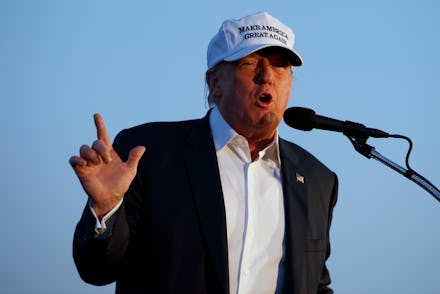Donald Trump is walking a dangerously fine line with his tough talk on terrorism

The condemnations came quickly.
Just after an explosion rocked the heart of New York's Chelsea neighborhood Saturday night, Republican presidential hopeful Donald Trump was on the case: Before authorities made any official pronouncement, he told a Colorado crowd that "a bomb" had just gone off in his hometown.
On Monday morning, Trump gave his detractors more fodder when he appeared to take a victory lap, saying he'd "called it" on the Chelsea blast that wounded dozens and put the city on alert.
But scant hours later came the news that a suspect in the Manhattan attack, Ahmad Rahami, was in custody after shooting a police officer in Linden, N.J.
Around the same time, the U.S. Military Academy at West Point went into lockdown thanks to a suspicious-vehicle sighting.
While the latter turned out to be a false alarm, it illustrates the public's rising awareness of its vulnerability to attack.
It also raises the question, difficult to answer now, of whether an uneasy electorate will see Trump's tough talk as needed strength rather than mere braggadocio as he fights Democrat Hillary Clinton for the keys to the Oval Office.
In contrast with Trump, New York City Mayor Bill de Blasio initially hesitated to call the Chelsea blast an act of terrorism. Although there's a long political backstory with the mayor there, Gov. Andrew Cuomo showed no such hesitance the following morning.
And Clinton herself went after Trump for running off at the mouth before gathering the facts.
But how will voters see it?
"So far in this election season, terrorist events — as opposed to a more general fear of terrorism — do not appear to have put a great deal of lift under Trump's wings," said David Birdsell, dean of the Baruch College School of Public Affairs in New York.
"While some will mock our mayor and governor for 'political correctness,' they looked strong and calm [Sunday] as law enforcement demonstrated [competence] in finding and isolating additional bombs," Birdsell said.
By comparison, "Trump risks looking reactionary and alarmist in contrast to real public officials doing the methodical work of keeping the public safe," he said. "That optic could change very quickly, though, if there are more bombings or other terrorist events in the near future."
Trump's campaign directed wider attacks at Clinton, the former secretary of state, through Monday morning, attempting to capitalize on the unrest at home by bringing it to the world stage.
Clinton accused Trump of feeding the trolls and giving the Islamic State terror network just what it wants by running off at the mouth, prompting a Trump spokesman to lash back in a statement that "the only thing we can expect from a Hillary Clinton presidency is more attacks on our homeland and more innocent Americans being hurt and killed."
The Democratic nominee had no shortage of her own detractors, including those who suggested she's being coddled by an anti-Trump press:
But there were also plenty of Republicans and right-leaning pundits who came after Trump for politicizing a tragedy — again.
Republican strategist Evan Siegfried, a lifelong New Yorker and Trump opponent who penned a recent book on the future of the GOP with young voters, went deeper.
"We saw it again with Trump where he takes a tragedy or major event and makes it all about him. He tweeted that he was right yet again and tried to score political points while a situation was fluid," Siegfried said. "That's not presidential — it's shameful."
It's a tight race, and with some 50 days to go before the election, fortunes could turn on a superPAC's dime and the Trump people know it.
Broadly, said Darrell West of the Brookings Institution, "terrorism generally has been a good issue for Trump because it plays to his argument that the world is a dangerous place and America needs a tough leader. He will say that this confirms his narrative that the United States is under attack and extraordinary measures are needed to protect the country."
In that regard, what may seem like Trump recklessness to critics may translate into a strengthened argument for the Republican, West said: "His best argument is that America needs a leader as tough-minded as our adversaries. In a world filled with violence and aggression, he says that it is not time for caution but bold leadership."
By comparison, de Blasio's more measured approach — whatever the reasoning behind it — "seemed confusing," West said.
"He didn't appear to want to acknowledge this was a terrorist attack even though it clearly was a bomb that sought to harm a lot of people. It would make more sense to acknowledge the reality of a bomb and figure out who did it and go get them."
With 50 days until Election Day, it is difficult to gauge and impossible to pinpoint the effect the latest and future potential attacks could have on the race for the presidency.
An ABC News/Washington Post poll released on Sept. 11 showed Clinton ahead among both adults overall and likely voters when they were asked whom they trusted to respond to terrorism.
Anyone who thinks catastrophe can't change the equation need only ask Mark Green: The Democrat was all but destined to become mayor of New York, until the 9/11 attacks came mere weeks before voters went to the polls and chose Republican Rudy Giuliani's anointed successor, Mike Bloomberg — and kept him in office for three terms.